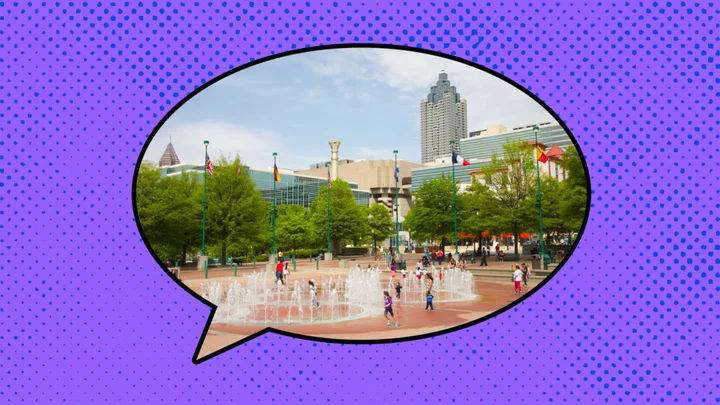As Rachel Maddow pointed out in 2022, Atlanta is arguably the cultural capital of the U.S. right now. Thanks to its recent, nationally significant elections, historic position as the cradle of the civil rights movement, and incredibly vibrant music scene, the brand of Atlanta doesn’t just resonate to its suburban areas—it hits every corner of the country. Which means that a lot of our homegrown slang might be pretty recognizable, especially the many slang terms originated and/or popularized by ATL rappers like Gucci Mane, Migos, and 2 Chainz. But there’s always a chance you could get caught off guard while visiting, so here’s a handy sampler of terms you should know if you decide to hold it down in A-Town.
1. and 2. ITP and OTP
I-285 is known locally as the perimeter because it separates the city from the suburbs. Originally a two-lane highway, it was built in 1955 to facilitate bypassing the city instead of having to drive through it, and it connects other major highway systems throughout Atlanta. Today, the perimeter is more than eight lanes wide and is used by an estimated 2 million people daily, making it one of the most heavily traveled highways in the U.S.
More from Our Site
- •
First Location of the ‘Friends’-Inspired Central Perk Coffee Chain Is Coming to Boston
•An International History of Dumplings
•Ireland Has a Plan to Repopulate Its Remote Islands: Pay People $92,000 to Move There
•The University of Wisconsin-Madison Is Hiring a Cheese Taste-Tester
It’s no surprise, then, that a number of slang terms have popped up to reference it: ITP, or “inside the perimeter,” means you live in Atlanta. OTP, or “outside the perimeter,” means you live in the suburbs. If you live OTP and have ITP friends, no you don’t—because they are not coming over.
3. Spaghetti Junction
Areas within the perimeter also have nicknames. Tom Moreland Interchange, one of the major interchanges on 285, has been dubbed Spaghetti Junction thanks to its many ramps and bridges, which make it resemble a plate of tangled noodles.
The perimeter is so confusing that it led to a now-legendary story: In 1982, Atlanta Braves pitcher Pascual Perez, who was new to the city, accidentally got on 285 and drove in a loop multiple times. He got to the stadium after the national anthem, but sat out the game so his colleague, Phil Niekro—who had been told he would start––could pitch. The Braves actually won that game, and their manager Joe Torres gave Perez most of the credit, saying his navigational gaffe was so hilarious that it improved team morale and helped them overcome a 2-19 game losing slump. Perez was nicknamed Perimeter Pascual after the incident.
4. We Full
The population in Atlanta has exploded in recent years and shows no signs of slowing; in fact, some estimate the population with hit more than 8 million people by 2040. Between the career opportunities, the relatively reasonable cost of living, and the entertainment and food options, it’s not hard to see why Atlanta is a pretty attractive place to nest. But thanks to a lack of mass transit and sprawling, car-centric infrastructure, the traffic is already so bad that locals can’t wrap their heads around 2 million more cars on the road. That’s why you shouldn’t be offended if the response to “Hey, should I move to Atlanta?” is, “No! We full!”—even though we technically aren’t.
5. WaHo
Google WaHo and you’ll get results for the West African Health Organization or the World Arabian Horse Organization. Mention it in Atlanta, and you’ll be on your way to get something scattered, smothered, and covered at Waffle House. The very first Waffle House opened in Avondale Estates, Georgia, and now Atlanta boasts the most locations in the nation (132 as of 2014). Why WaHo? Perhaps because sometimes the lights are out in the bright yellow sign and only the “Wa” and “Ho” are visible.
6. Whatchu Talmbout
A lot of Atlanta slang derives from AAVE, or African-American Vernacular English—unsurprising from the city dubbed the “Black mecca of the South” by Ebony magazine. Whatchu talmbout means “what are you talking about,” and it’s either a sincere question or a mocking response to something silly someone said (though you’re even more likely to hear “hell you talmbout” in that instance). It can also be used as a statement, especially for mocking reasons; for example, if someone says, “Randy over here talmbout ‘I could beat Serena at tennis,’” they’re saying Randy not only can’t, he was lacking in judgment to suggest he could in front of people who know better.
7. and 8. Trap House and Plug
You might recognize the phrase trap house––which refers to a house used for selling drugs––from Gucci Mane’s 2005 song and album of the same name. The term, also referenced in Spike Lee’s 1991 film Jungle Fever, goes back even further: In 1841, it referred to a brothel where clients, sufficiently distracted by a sex worker, would get robbed or “rolled” by an unseen accomplice.
The trap music genre is 100 percent Atlanta-grown, and blends rap, hip-hop, and trance music where the lyrics talk about city life and being a “plug”—that is, a drug dealer.
9. The Hooch
The Hooch refers to the Chattahoochee River, which stretches from Alabama to Florida and provides electricity and drinking water to around 6 million Atlantans. One of the greatest summer activities for ITP and OTP folks alike is to grab some friends and some booze and “shoot the Hooch”—that is, lay back on a raft or inner tube and let the river take you gently downstream.
10. Fye
In AAVE, fire refers to something being really cool, well-done, or exciting (for example, “That concert was fire”); Black Atlantans shorten this already short word to fye.
11. Lemon Pepper Wet
Lemon pepper is a popular dry rub for chicken wings, which is one of Atlanta’s favorite foods. But if you want to take your wings to the next level, ask for them lemon pepper wet, which includes a splash of clarified butter or buffalo sauce. (But do us a favor and please don’t leave your chicken bones scattered around.)
12. Get to Gettin’
This means it’s time to leave. But you may as well say it as soon as you arrive, because a Southern goodbye takes quite a lot of time.
13. Underground
Atlanta wasn’t always Atlanta: After the city was founded in 1837, it went by both Terminus and Marthasville (for the governor’s daughter). The Georgia Rail Depot building, completed in 1869, is one of the oldest buildings in the city. Several rail lines sprung up there, causing traffic problems—so city leaders chose to build viaducts above the railroad to ease gridlock.
By 1929, “street level” was actually one story up; the original streets of Pryor, Alabama, Ponder’s Alley, and Kenny’s Alley were covered over with reinforced concrete, creating Underground Atlanta—or, for locals, simply Underground. The 12-acre district was used mostly as basement storage, though it also hosted speakeasies and juke joints during Prohibition; after that, it was largely forgotten about until the 1960s, when the 1920s-era architectural features, like brick walkways, cast-iron pilasters, hand-carved wooden posts, and gas street lamps, were discovered, perfectly preserved, beneath the rapidly growing city streets above. Since then, Underground has served as a tourist destination and entertainment district, with mixed success.
14. Skrrt-skrrt
Referencing the sound tires make when you pull off quickly, skrrt-skrrt means “let’s go now,” or “get there quickly.” A perfectly intelligible sentence in Atlanta would be, “let’s skrrt-skrrt to see the plug before we get that lemon pepper wet.”
15. and 16. Cap and No Cap
This might feel like pretty new slang to a lot of parents out there, but the Black community have used the term cap to refer to someone exaggerating or lying since the 1900s. (From our previous example, Randy would have been capping by pretending to be better at tennis than Serena Williams.) Atlanta rappers Young Thug and Future released the song “No Cap” in 2017; the phrase means “no lie,” “no exaggeration,” or “no joke,” and usually comes at the end of a sentence to show that the person is telling the full truth and nothing but the truth.
17., 18., 19., and 20. ATL, A-Town, The A, Atlannuh
It’s never, ever Hotlanta. As Monday Night Brewing cofounder Jonathan Baker pointed out in an interview with Atlanta magazine, “Hotlanta is an old nickname and one that carries very narrow connotations. It doesn’t represent the diverse, vibrant, eclectic city that we are now.”
Home / LANGUAGE








